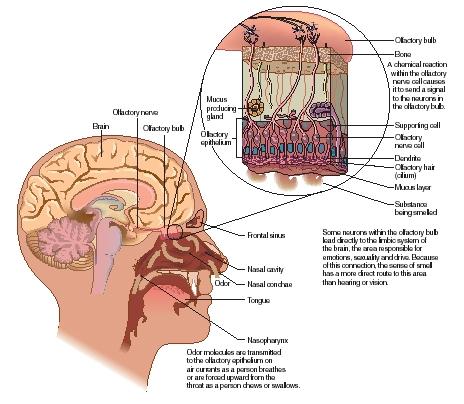Smell

Smell, called olfaction, is the ability of an organism to sense and identify a substance by detecting tiny amounts of the substance that evaporate and produce an odor. Smell is the most important sense for most organisms. Many species use their sense of smell to locate prey, navigate, recognize and communicate with others of their species, and mark territory.
The sense of smell differs from most other senses (sight, hearing, taste, and touch) in its directness. We actually smell microscopic bits of a substance that have evaporated and made their way to the olfactory epithelium, a section of the mucous membrane in the roof of the nasal

cavity of the nose. The olfactory epithelium contains millions of odor-sensitive olfactory nerve cells that are connected to the olfactory nerves. Hairlike fibers on the end of each olfactory cell react to an odor by stimulating the olfactory cells to send a signal along the olfactory nerve to the brain, which interprets the signal as a specific smell.
Human versus animal smell
There is no doubt that many animals have a sense of smell far superior to that of humans. Most vertebrates (animals with backbones) have many more olfactory nerve cells than humans. This probably gives them much more sensitivity to odors. Also, the structure in the brain that processes odors (called the olfactory bulb) takes up a much larger part of the brain in animals than in humans. Thus, animals have a greater ability to process and analyze different odors. This is why humans use dogs to find lost persons, hidden drugs, and explosives—although research on "artificial noses" that can detect scent even more reliably than dogs continues.
Still, the human nose is capable of detecting over 10,000 different odors, even some that occur in extremely minute amounts in the air. Many researchers are considering whether smell does not play a greater role in human behavior and biology than has been previously thought. For instance, research has shown that human mothers can smell the difference between clothes worn by their baby and those worn by another baby only days after the child's birth.
Words to Know
Olfactory bulb: The primitive part of the brain that first processes olfactory information.
Olfactory epithelium: The patch of mucous membrane at the top of the nasal cavity that contains the olfactory nerve cells.
Olfactory nerve cell: A cell in the olfactory epithelium that detects odors and transmits the information to the brain.
Pheromone: Scent molecules released by animals that affect the behavior of organisms of the same species.
Scientists are only beginning to understand the role that smell plays in animal—and human—behavior. For example, animals release chemicals called pheromones to communicate danger, defend themselves against predators, mark territory, and attract mates. Some researchers have suggested that humans also may release pheromones that play a role in sexual attraction and mating—although this hypothesis has not been proven.
Current research
Olfactory nerve cells are the only nerve cells arising from the central nervous system that can regenerate (be formed again). Some researchers hope that studying regeneration in olfactory nerve cells or even transplanting them elsewhere in the body can lead to treatments for spine and brain damage that is currently irreversible.
Many years later and now in middel age I still yearn to have my smell back, that yearning never leaves you. I wish there was something that could be done to reconnect those nerves.